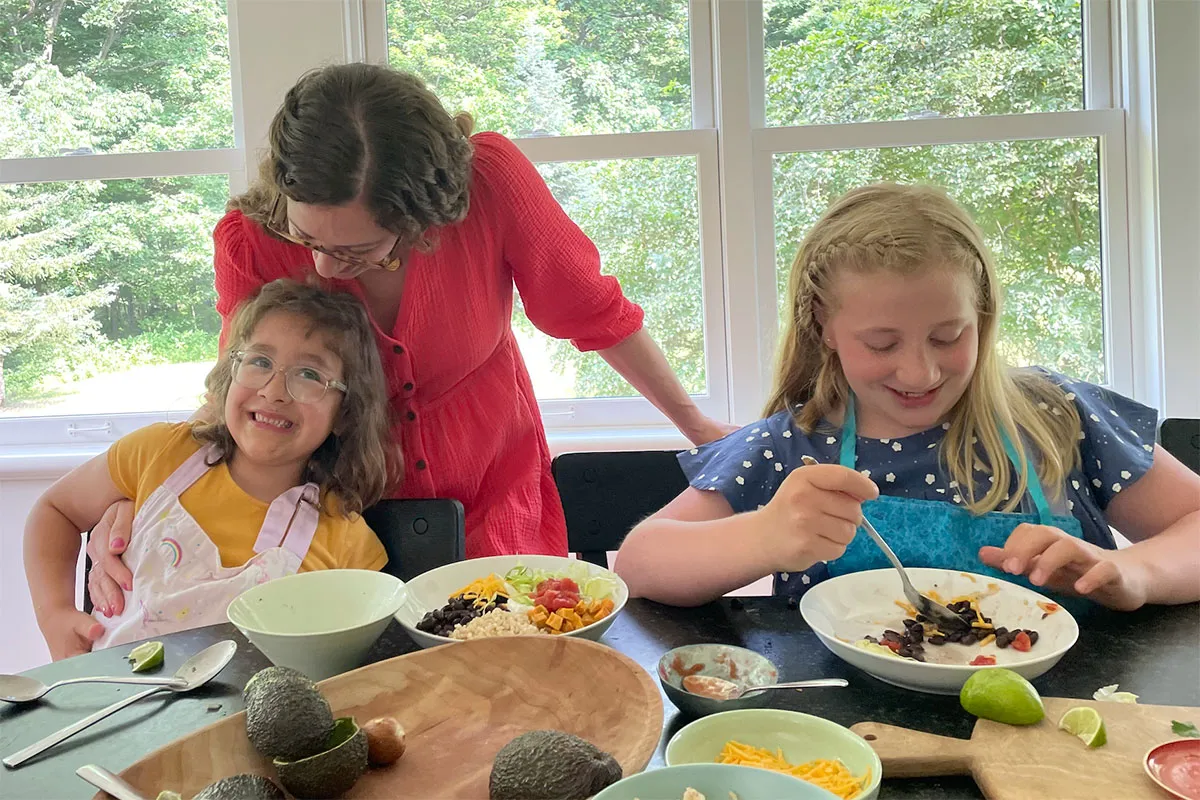Welcome to YTF Community, a place to safely share in the challenges and joys of feeding our families. If you’re looking for recipes, feel free to go right to the home page of yummytoddlerfood.com.
We’re in that part of the winter when it seems like school is forever delayed or cancelled, so there is a constant parade of puzzle on the floor, action figures on the counter, and Chocolate Protein Muffins going in and out of the oven. And in between rounds of shoveling my front steps, I have been fielding this question over and over and over again: “Why won’t my son eat dinner??” Or, “No matter which recipes of yours I make, my kids just want snacks for dinner. Help?” Or, “My child eats so well at daycare but never seems to want anything at home. What am I doing wrong??”
You’re not doing anything wrong, and one way to believe me when I say that that is to look at some of the super common reasons kids aren’t eating dinner so that we can both understand it—and also, crucially, worry less. They are below for you. (Because worry often equals anxiety, and anxiety makes it much harder to interact calmly with the kids…which certainly can make all of this harder.)

1. They’re tired. At the end of the day, kids may be tired and more interested in comfort than food. This can increase preference for foods that are easy to eat and familiar. (And be related to why they may want to sit on us instead of in their own chairs.)
2. Many little kids “front load” their calories, which means they eat more in the first part of the day, and it tapers off as the day goes on. So intake by dinnertime is low because they’ve already gotten what they needed.
3. The food is too hard for them to eat without frustration, so they stop eating because the payoff isn’t there quickly enough. (If you notice this, try cutting the food smaller, shred it, or even help the kids load the food onto their fork or spoon to make it easier.)
4. The food isn’t yummy enough. (We often forget to taste food we’re serving to our kids and while this isn’t a critique of anyone’s cooking, it’s possible the kids don’t find it appealing. You can always add a dip, sauce, or other flavorings to increase appeal. Also: No one likes every food.)
5. Kids are often distracted by life happening around them because they are in such a peak phase of brain development, noticing EVERYTHING. (Try sitting and chatting with them to bring focus to the table, yes, even if they can’t talk back much yet, or turn on a podcast or music.)
6. They’re not hungry because they’re full from afternoon snack. (This isn’t necessarily a problem to solve, especially since kids are often hungrier at 3:30 or 4 pm than they are at our normal dinner time, but you could make that snack more of a “mini meal” with a mix of food groups if you prefer. Or move snack a little earlier if that’s possible with your schedule. Then there may be more time for hunger to build for dinner.)
7. They’re resisting dinner because they can feel how badly you want them to eat it. Some kids react strongly when they feel pressure, and may not want to try foods or eat foods simply because they know you want them to. (A great way to handle this is to talk about things other than food so you can connect with the kid and take the focus off of their plate.)
8. They don’t see their favorite foods, which can increase anxiety. (Add 1-2 foods at each meal they usually like, which can make a meal feel safer and reduce anxiety to allow the possibility of intake to be there.)
9. New foods are scary. It can be really hard for a little kid to try a new food because they simply don’t have a huge base of knowledge to help them be able to predict how something may taste or feel in their mouths like we do as adults. This is normal. (It can help to give them something to DO to the food to let them engage on their own terms, like spreading, cutting, sprinkling, or helping to plate their own meal.)
10. They’re just not as hungry as you expect. Accurately predicting another person’s hunger is nearly impossible. Start with smaller portions to reduce food waste and remember that it’s okay to trust the kids when they show you their appetite.
Dinner is just one meal of the day, and whether or not everyone eats it doesn’t have to be such a big an indicator of our “success” as a parent. Making some tweaks to the set-up can improve things to allow everyone to sit together and eat enough to fill bellies before bed, but it’s probably never going to be perfect. It sure isn’t in my house, but it’s good enough.






















All comments are subject to our Terms of Use.